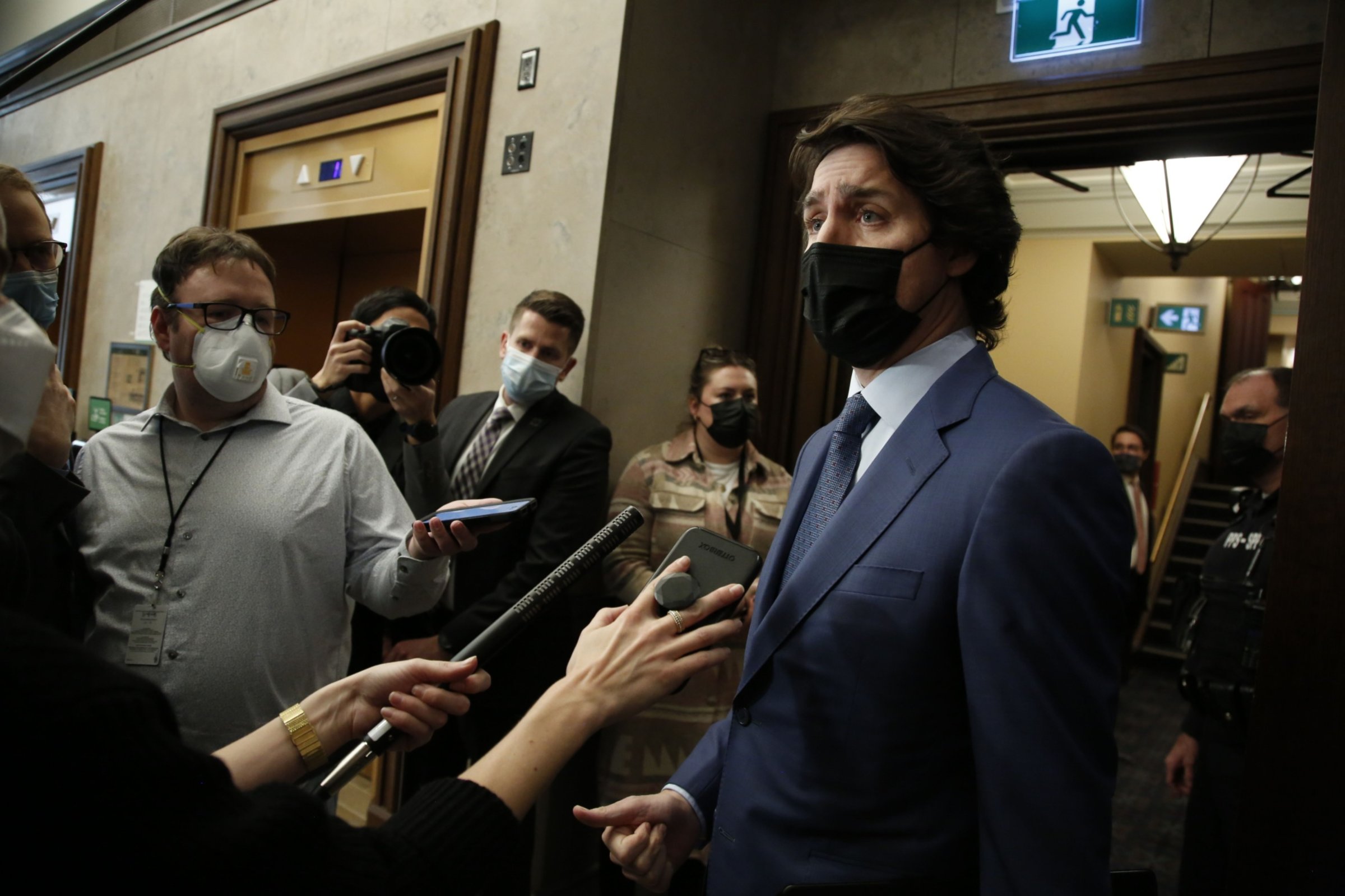
Prime Minister Justin Trudeau defended his use of emergency powers to get protests across Canada under control after the opposition Conservatives accused him of using an “unprecedented sledgehammer.”
Debate in the legislature turned fiery Tuesday after Trudeau’s government gave itself the power to ban public assembly in certain locations and ordered Canada’s banks to freeze the accounts of those involved in the blockades. Conservative Leader Candice Bergen said the prime minister’s decision to use the emergency law is about an “ideological attachment to keeping Covid restrictions and mandates.”
Trudeau said the measures will be temporary and targeted to specific areas. “They are reasonable and proportionate to the threats they are meant to address,” he told lawmakers.
But details remain scarce, both in public and behind the scenes. Canadian bank executives still have numerous questions about the government’s orders, including which types of accounts it covers and how the banks will be indemnified, according to people familiar with the matter.
It will take time for banks to change their systems for screening transactions, Sue Ling Yip, a partner in KPMG Canada’s risk consulting and financial crimes practice, said in an interview. “For them to start monitoring for additional things and add additional criteria to what is deemed suspicious — it doesn’t happen overnight,” she said.
The financial-system measures are designed to cut off the flow of funds to demonstrators, including foreign donations. Banks may be inclined to overreact in enforcing the mandate in order to avoid running afoul of the government, according to Andreas Park, a professor of finance at the University of Toronto.
“They may very well catch a lot of normal people in the process, like international students and snowbirds. We’re going to see some disruption, probably,” Park said in an interview. “Essentially what we’re doing now is deputizing the private sector to do monitoring of citizens on behalf of the government and act on the basis of suspicions without due process.”
Columns of big-rig trucks converged on the streets outside the parliament buildings in Ottawa, the Canadian capital, on Jan. 28. Offshoot demonstrations spread to U.S. border posts, including the Ambassador Bridge to Detroit and two major crossings in western Canada.
Trudeau initially dismissed the convoy as a “small fringe minority” and said it was up to provincial and local police to maintain order. That changed Monday when, flanked by his attorney general and finance minister, he announced he would use the Emergencies Act in a bid bring the protesters to heel.
The Canadian Civil Liberties Association said in a statement it doesn’t believe the situation meets the “high and clear” threshold needed to invoke the act, and voiced concern the move could result in the normalization of emergency legislation.
Traffic across the Detroit bridge, which carries one quarter of Canada’s commerce with the U.S., resumed late Sunday after a six-day halt. Protesters who had blocked border crossings in the western provinces of Alberta and Manitoba have also departed or made plans to leave.
Ottawa’s downtown core, however, remains paralyzed and its police chief resigned Tuesday, deepening the crisis.
The full slate of emergency measures must be approved by lawmakers in parliament within seven days.
Francois-Philippe Champagne, the minister responsible for Canada’s auto sector, said the decision to use emergency powers is a message to the industry that the government is fully committed to keep trade with the U.S. moving.
Champagne, speaking by phone Tuesday morning, said he assured auto executives in calls on Monday that the government’s “decisive action” aims to uphold Canada’s “great reputation for stability, predictability and the rule of law.”
The emergency powers “will go a long way in order to reassure our partners that we are taking the measures which are necessary to protect and maintain these very critical supply chains,” he said.
Public Safety Minister Marco Mendicino told reporters the legislation was necessary because police are not just up against truckers protesting Covid restrictions, but also a hardcore group with more violent intentions. He pointed to the seizure of a cache of weapons at an Alberta protest as an example.
“What is driving this movement is a very small, organized group that is driven by an ideology to overthrow the government, through whatever means they may wish to use,” Mendicino said. “Yesterday’s arrests in Coutts should be a cautionary tale.”
More Must-Reads from TIME
- Cybersecurity Experts Are Sounding the Alarm on DOGE
- Meet the 2025 Women of the Year
- The Harsh Truth About Disability Inclusion
- Why Do More Young Adults Have Cancer?
- Colman Domingo Leads With Radical Love
- How to Get Better at Doing Things Alone
- Michelle Zauner Stares Down the Darkness
Contact us at letters@time.com